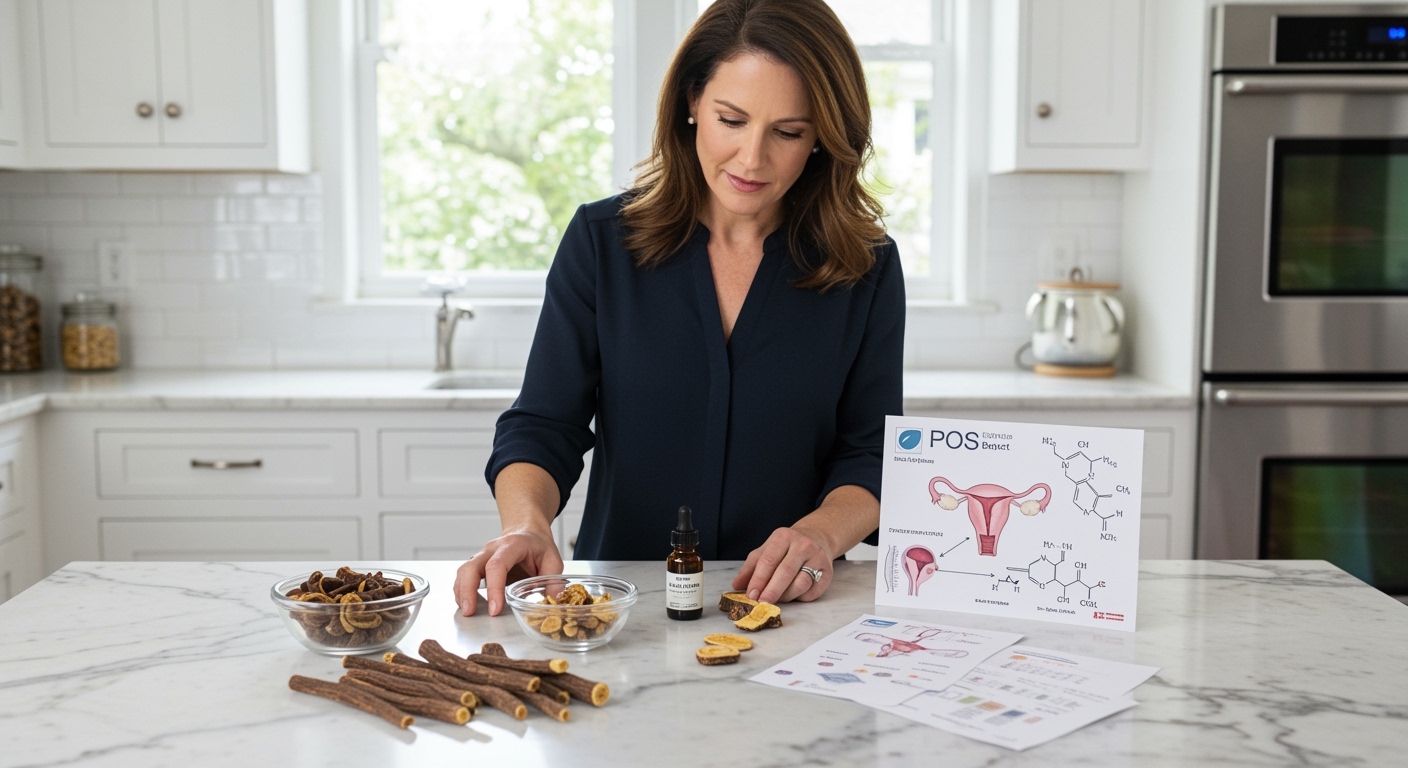✪ Key Takeaway: Licorice root shows modest potential for reducing androgen levels in PCOS, but evidence remains limited and effects vary significantly.
Introduction
You scroll through social media and see another post claiming licorice root is the miracle cure for PCOS androgens.
You wonder if this sweet-tasting herb could finally help balance your hormones and reduce those frustrating symptoms like excess hair growth and acne.
Hi, I’m Abdur, your nutrition coach and today I’m going to explain exactly what the research shows about licorice root and PCOS androgen levels.
What Makes Licorice Root Special For Hormones?
Licorice root contains a powerful compound called glycyrrhizin that can influence hormone production in your body.
This compound works by inhibiting an enzyme called 17β-hydroxysteroid dehydrogenase, which plays a key role in androgen metabolism.
When this enzyme is blocked, your body produces less testosterone from its precursor hormones.
Licorice root also affects cortisol metabolism, which can indirectly influence androgen levels in women with PCOS.
The herb contains additional compounds like isoliquiritigenin and glabridin that may provide extra hormonal benefits.
✪ Fact: Licorice root has been used in traditional medicine for over 4,000 years to treat various hormonal conditions.
What Does The Research Actually Show?
A small study published in 2019 found that women with PCOS who took 3.5 grams of licorice root daily showed modest reductions in testosterone levels.
The participants experienced an average 32% decrease in total testosterone after 2 months of supplementation.
However, this study only included 20 women, making it difficult to draw definitive conclusions about effectiveness.
Another research paper showed that licorice root extract reduced free testosterone levels by approximately 25% in women with hirsutism.
The problem is that most studies on licorice root and PCOS are small, short-term, and lack proper control groups.
We need larger, longer studies to understand the true effectiveness and safety of licorice root for PCOS management.
✪ Note: Most licorice root studies for PCOS lasted only 2-3 months, so long-term effects remain unknown.
Are There Any Serious Side Effects To Consider?
Licorice root can cause high blood pressure in some people due to its effects on mineral balance in your kidneys.
The glycyrrhizin compound can lead to potassium depletion and sodium retention, creating cardiovascular risks.
Women with existing blood pressure issues should avoid licorice root or use it only under medical supervision.
Some people experience headaches, fatigue, and water retention when taking licorice root supplements regularly.
The herb can also interact with certain medications, including blood thinners and blood pressure medications.
Pregnant and breastfeeding women should completely avoid licorice root due to potential hormonal effects on the developing baby.
✪ Pro Tip: Start with the lowest effective dose and monitor your blood pressure regularly if you choose to try licorice root.
How Should You Use Licorice Root For PCOS?
Most studies used standardized extracts containing specific amounts of glycyrrhizin rather than raw licorice root powder.
The effective dose appears to be between 1-3.5 grams of licorice root extract daily, taken with meals.
You should start with the lowest dose and gradually increase it while monitoring for any side effects.
Taking licorice root with food can help reduce potential stomach upset and improve absorption.
Consider cycling your use by taking licorice root for 2-3 months, then taking a break for 1 month.
Always choose high-quality supplements from reputable manufacturers that provide third-party testing results.
✪ Note: DGL (deglycyrrhizinated licorice) removes the glycyrrhizin compound, making it safer but potentially less effective for hormone balance.
The Bottom Line
Licorice root shows promise for reducing androgen levels in PCOS, but the evidence is still preliminary and limited to small studies.
Natural does not always mean safe or effective for everyone, and licorice root comes with real risks that you must consider carefully.
I encourage you to share your thoughts, questions, or experiences with licorice root in the comments below so we can learn from each other.
References
At NutritionCrown, we use quality and credible sources to ensure our content is accurate and trustworthy. Below are the sources referenced in writing this article:
- PMC: Licorice Root Extract and Metabolic Effects
- Frontiers in Endocrinology: Natural Products for PCOS Management
- PMC: Herbal Medicine in PCOS Treatment
- CTV Veeva: Licorice Root Evaluation in PCOS





